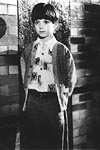
Features:
Photo Encounters |
Forum
FAQ |
Disclaimer |
40 visitors online.
Contact Us:
Deenan |
Lucy |
Brenda
Skins:
Faces | Raindrops | Spring Clean



 |
FOLLOW A&F ON TWITTER
|
|
|

|
AVALON (1990)
|


Michael Kaye
Writer/Director Barry Levinson closes out his Baltimore Trilogy with "Avalon," a visually enchanting, magnificently assembled tale of the Krichinsky family over a period of several decades. Levinson beautifully captures the family's journey to America as immigrants and the trials and tribulations they face in discovering America, economic success, and each other.
Aidan Quinn serves as the centerpiece for the action, and Levinson wisely allows the action to evolve essentially around his experiences in America, business and family. As Jules, Quinn is marvelous and reminds us why we ever hoped for his career to blossom. Quinn's performance is one of great power and yet one also of great sensitivity.
It is this sensitivity that allows "Avalon" to stand out among films. Levinson, better than most American writers, captures the complexities of the male spirit and heart. Levinson's male characters are never one-note. Instead, Levinson creates men of strength who are comfortable in their masculinity and, yet, also strong enough to care openly and expressively. Even in a film such as the nearly disastrous "Toys," Levinson creates a character who is at once sensitive and child-like yet strong enough to confront the most dastardly evil. Levinson offers a refreshing spin on masculinity that I embrace and celebrate.
Quinn is surrounded by a family of solid performances including Armin Mueller Stahl, Joan Plowright, Lou Jacobi and Leo Fuchs. In supporting roles, Elijah Wood and Elizabeth Perkins shine particularly brightly.
"Avalon" remains visually mesmerizing throughout, however, the screenplay itself starts to falter towards the end of the film. In some ways, the messages of the film begin to overtake the characters and we are left with a film that becomes more an intellectual exercise than a celebration of family. This "soapbox" approach has plagued Levinson before and completely sunk the otherwise appealing "Toys."
Yet, just when it appears that "Avalon" is destined to become lost the charm and beauty returns and we are allowed to again embrace the family we have grown to care about. The film is somewhat reminiscent of Jim Sheridan's "In America," a later film that much more successfully captures the spirit and heart of this time period and experience.
Visually stunning, occasionally frustrating but nearly constantly inspiring, "Avalon" is a film of beauty, simplicity and hope that will make you want to call up your parents and just say hello.
********
Barry Levinson's "Avalon" is a rich, graceful work of lulling sentiment. Sprung from Levinson's memories of his grandfather and the immigrant culture he knew as a child, it is a love story. But in this case the love object is the past, and in the larger sense the American past as reflected in the eyes of the people who came here and encountered the country in its innocence as the realization of their dreams of freedom and enterprise.
The film's point of view is split between Sam (who's played brilliantly as an older man by Armin Mueller-Stahl) and his grandson, Michael (Elijah Wood). But Levinson also presents a colorful ensemble of nephews, aunts and uncles. The Krichinskys are a tight-knit group who work, raise their families and celebrate holidays together. During their clan meetings they determine which charities they will contribute to, make plans to bring over other relatives, and bicker.
What Levinson is showing us is the birth of the suburban middle class and, by exploring Jules and Izzy's business expansions, the spawning grounds for middle-class anxieties as well. Still, Levinson isn't interested in mere sociology. He's interested in behavior, particularly the behavior of ordinary people, and he keeps the narrative centered in the details of family life.
Levinson has always assembled strong ensembles for his Baltimore films, and "Avalon" is no exception. In the bigger family scenes, he creates a feeling of intimate byplay between the actors. They spar and overlap neatly and, in the case of an exchange centering on the movie "Stagecoach," masterfully. The lead performances too are movingly expert. As the older Sam, Mueller-Stahl has a touch of dashing Old World poetry in him. He gives the movie its soulful plaintiveness. And he's just as effective in his scenes with Eva, who is played by Joan Plowright in a manner that suggests what Margaret Dumont might have been like if she'd turned cantankerously dotty.
Levinson's hand does shake a little late in the film. Also, at times the film seems almost too polished and symmetrical; Levinson, in fact, may be trying too hard to get it all right and manages instead to leave everything a little too pat.
What this amounts to, though, is third act problems. He can't resolve his story, so he settles instead for a neatly wrapped package. But the gift inside the wrapping is a luxurious one. With "Avalon," Levinson reaches into his deepest self, and an artist can't be asked to do much more.
|
| |
|
| |
|
|
|





